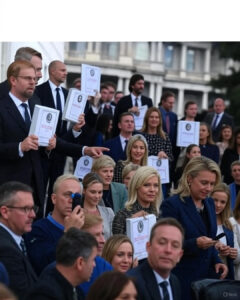The Email That Changed Everything
In a revelation that has sent shockwaves through the ongoing Epstein saga, a 2015 email from Ghislaine Maxwell to her attorney and PR consultant captures the moment her relationship with Virginia Giuffre irreparably fractured. Sent just days after Giuffre filed court papers in Florida accusing Maxwell of trafficking her for sexual exploitation, Maxwell’s message exposes her panic: “I am out of my depth to understanding defamation and other legal hazards. I do not wish to be in front of a jury in America.” This raw admission marks the instant their once-entwined paths—Maxwell as recruiter, Giuffre as victim—collapsed into open hostility, stirring empathy for Giuffre’s courage and surprise at Maxwell’s vulnerability. The email, part of unsealed court filings from Giuffre’s defamation lawsuit, contrasts Maxwell’s poised public image with her private turmoil, igniting debates on complicity and justice.

From Recruitment to Rupture
Giuffre’s association with Maxwell began in 2000 at Donald Trump’s Mar-a-Lago, where the then-16-year-old was lured with promises of massage training, only to be drawn into Epstein’s web of abuse. What Maxwell framed as mentorship devolved into exploitation, with Giuffre alleging she was trafficked to figures like Prince Andrew. The 2015 court filing by Giuffre, detailing Maxwell’s role in facilitating encounters, triggered the email—Maxwell lamented the “terrible and painful loss” from press scrutiny, fearing endless questions about her ties to Andrew and Bill Clinton. This breaking point evokes deep curiosity about their dynamic: Was it ever a friendship, or always a power imbalance? Giuffre’s later testimony in Maxwell’s 2016 deposition branded her an “absolute liar,” underscoring the betrayal’s depth and fueling admiration for Giuffre’s stand against her former “madame.”
Revelations That Fuel the Fire
The surfaced email isn’t isolated; it ties into a trove of communications unsealed in 2020, including Epstein reassuring Maxwell she did “nothing wrong” amid the fallout. Maxwell’s distress over Giuffre’s accusations—claiming she trafficked her to Andrew in London, New York, and Epstein’s island—highlights the instant trust shattered, as Giuffre demanded accountability. This contrast between Maxwell’s fear of a “US legal nightmare” and Giuffre’s resolve surprises, especially given Maxwell’s 2021 conviction for conspiring with Epstein to abuse minors. The email’s release in Giuffre’s defamation suit, settled but now echoing in her posthumous memoir Nobody’s Girl (released October 21, 2025), stirs debate: Does it expose Maxwell’s guilt, or merely her anxiety?
Igniting a Broader Reckoning
As this email resurfaces amid calls to reopen Giuffre’s 2022 settlement with Andrew (reportedly £12 million), it ignites fierce discussions on elite impunity. Social media erupts with empathy for Giuffre, who endured PTSD and isolation post-escape, versus scrutiny of Maxwell’s prison denials—like claiming the Andrew-Giuffre photo is “fake.” The breaking point email, revealing Maxwell’s plea for “head space” to rest, humanizes her briefly but underscores the betrayal’s impact on Giuffre’s life. This narrative fuels curiosity about untold emails in Epstein’s 18,000-message cache, potentially revealing more collapses in alliances. Advocates demand transparency, while defenders argue it’s rehashing old wounds—will this lead to new probes?
Will You Join the Debate?
With Giuffre’s voice preserved in her memoir, this shocking email demands participation in the reckoning: Can one message shatter decades of silence, or will power prevail? Giuffre’s family echoes her fight, slamming figures like Andrew for evasion. As debates rage, the email’s surfacing challenges society to confront complicity—join in, or let the truth fade?
Leave a Reply